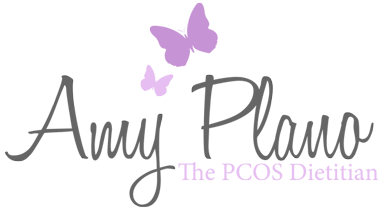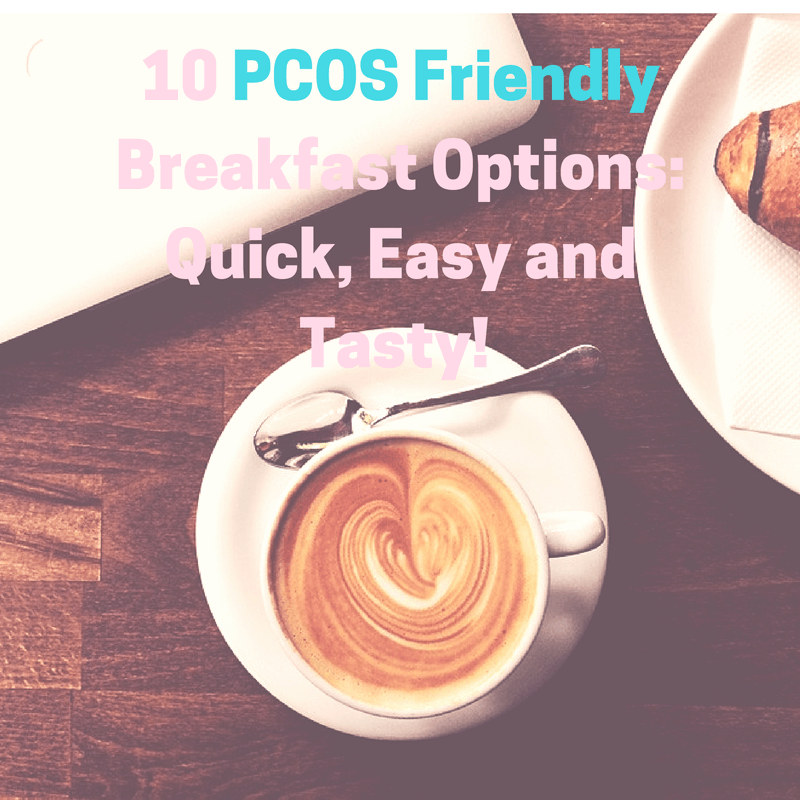
by AmyPlano | Nov 7, 2016 | PCOS and carbohydrates, PCOS Breakfast Foods, PCOS friendly recipes
PCOS Friendly Breakfast Choices
There is no denying it – breakfast is the most important meal of the day. Breakfast gives you energy and provides the body and brain with fuel after an overnight fast. Breakfast can help improve memory and concentration levels. It can also help with weight management as you are less likely to overeat eat later in the day after having a healthy breakfast. But this is easier said than done. Cooking up a PCOS friendly breakfast can be challenging – but it should not have to be. Especially because there are so many breakfast options that are super easy, tasty and healthy

For someone with PCOS, you should aim for a breakfast with 30 grams of carbohydrates or less. In addition, you should do your best to include a protein source to help keep you full longer. Good protein sources include: greek yogurt, organic eggs, cottage cheese, whey protein, nitrate free turkey sausage or low-fat cheese) You don’t want to start your day off super carb heavy – as it will usually set the sluggish tone for the whole day. Plus, jamming down a pile of carbohydrates in the morning is not good for your blood sugar and insulin levels. Most of all, this only sets the scene for your blood sugar to come crashing down. We want to avoid this scenario at at any cost.
Consequently, you are thinking – what the heck can I eat that is quick, easy, tasty AND PCOS friendly? Well the PCOS Dietitian is going to share some of her favorite breakfast choices that fit the bill.
10 Quick and Easy PCOS Friendly Breakfast Choices
1. Make a yogurt parfait with Greek yogurt and add a serving of fruit, nuts, and/or granola. Most of all when choosing yogurt purchase one with less than 15 grams of carbohydrates per serving.
2. Cottage cheese is a great source of protein. As with yogurt, you can add fruit, nuts or even chia seeds to create a more balanced meal. I personally love the Friendship brand. I recommend the 2 % or 4 % fat as they taste pretty awesome.

Friendship cottage cheese is my personal favorite! This is because it creamy and has a nice overall favor profile.
3. Make oatmeal (please, use old-fashion oats if you have the time!) and add a source of protein such as nuts, nut butters, protein powder, or milk. Thinking about other cereal choices but not sure where to turn? Check out this past blog on PCOS friendly cereal options. You can also have eggs on the side or scramble some directly into the oatmeal.
4. Have a protein shake. Blend together a small serving of fruit, milk or a milk alternative such as almond or cashew milk, and protein powder. Be creative with your combinations. because the sky is the limit with shakes.
5. Make a breakfast burrito on a low carbohydrate wrap with a couple whole (yes, eat the yolk – that is where all the good nutrition is!) cage free organic eggs, cheese, and tons of vegetables. You can even top of your master piece with a couple tablespoons of black beans, salsa and Greek yogurt to bump up the protein even further!

6. How about some tasty, high protein chia pudding packed with omega 3’s and tons of fiber? Check out this awesome chia pudding recipe here from last week’s blog!
7. Make a healthier eggs benedict on ½ whole wheat English muffin topped with vegetables such as steamed spinach and a poached egg. Rather than use regular bacon – swap it for Canadian bacon. You can get the same flavor without all the fat.
8. Omelets are a fun breakfast option. Be creative and add a variety of vegetables. You can also pair it with a side of fruit or toast – just not both!
9. Want something super quick and easy – try my recipe for Chocolate Chip Banana Greek Yogurt Muffins. What’s not to like?
10. Hard-boiled eggs are great for a quick breakfast. Pair them with a slice of whole-wheat toast with peanut butter or small grab and go fruit such as a small banana, small apple or pear. Trader Joes sells eggs that are already cooked – which makes not having a protein with your breakfast not an option for even the laziest of PCOSers!
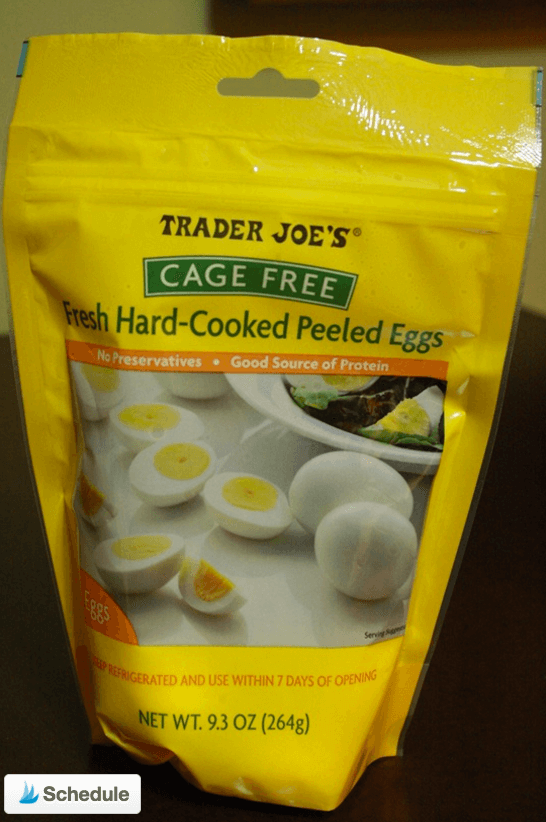
Already cooked hardboiled eggs – what could be easier?!?
Breakfast can be such a challenge but it does not have to be. Hopefully these PCOS friendly breakfast options provide you with some food for thought 🙂 As always, if you are looking for other great recipes please visit my Pinterest page and just search for Amy Plano, The PCOS Dietitian. I am a pinning maniac!
Got quick and easy breakfast choices you would love to share? I know you do! Please share your breakfast ideas in the comments below. As always thanks for stopping by.



by AmyPlano | Aug 25, 2016 | PCOS and College, PCOS and Weight Gain
PCOS and College
Do you have PCOS and are heading off to college? Is your head about ready to explode with all the information available on the web regarding nutrition, diet and PCOS? If so, you have come to right spot!
Holy cow, I cannot believe it is that time of year again. Can you? As a seasoned college professor you would think I would be used to this time by now. But every year the end of summer sneaks up on me. Insert sad face emoji. If you have PCOS and are heading off to college you may be experiencing a bit of anxiety regarding how to stick to your diet. Staying on track in college with your diet can be challenging – but certainly not impossible if you have PCOS.
College can be an exciting time! It is the first time you are on your own flexing those “independence muscles.” However, it can also be a very stressful time, full of uncertainty. And as if having PCOS was not bad enough – now you need to navigate an entirely different food domain. But fret not my friend – you are in luck. We have my Yale Dietetic Intern Jacquelyn Budlowski here, to give you some pointers on how to keep on track with your diet and exercise.
PCOS and College: Ten nutrition tips for staying on track with your diet
Write it down to stay on track with your diet

Start a food journal or use an app to track your intake and make sure you stay within your recommended calorie and carbohydrate alotment. Think of it as one of your daily homework assignments! We LOVE the myfitnesspal app as it super user friendly and allows you to track not only your calories – but also your carbohydrate, fat and protein intake. Studies show people who write down what they eat are more successfully at losing weight and keeping it off.
Get your little butt moving
Most college campuses have free gym memberships included with tuition. Many also offer group exercise classes. This can be a fun way to work out and beat the ho-hum of the treadmill. Some colleges even offer recreational sports as a fitness option. This can be a fun way to meet new people, fit in your exercise in and even try a new sport you may have been dying to try. Aim to exercise for at least 120 minutes per week.
Limit your alcohol intake
If you drink alcohol, keep in mind it supplies calories (and often carbs) but no nutritional value. A light beer, a glass of wine, or an ounce of liquor each has about 100 – 140 calories each. The carbohydrate content depends on what the alcohol is mixed with. Plus when your body is metabolizing alcohol – fat breakdown comes to a screeching halt. This can prompt weight gain and reduce your overall metabolism. Plus, alcohol increases your appetite and decreases your mindfulness leading to poor food choices. Did I just hear someone say “Let’s order Chinese ?!?”
Be mindful of “seconds”
It can be tempting to go up for a second plate knowing you have unlimited access to food with your dining card. However, ask yourself if you are really hungry before going up for a second helping. It is possible that you are just overwhelmed by the abundance of food and not really hungry. A good habit is to walk around the cafeteria and check out all the options before deciding what to eat. That way you can make the best balanced choice while getting what you really want in the first place.
Stock up on healthy PCOS friendly snacks
Keep healthy snacks in your dorm room. This way if you are up late studying, you will not be tempted to grab something from the campus store such as candy, chips, or ice cream. Good snack options include cheese sticks, low sugar Greek yogurt, hummus/veggies and even something like a Quest Bar in the event you cannot a balanced meal in.
Don’t Abandon Your Summer Goals
Continue to choose nutrient dense, high fiber options when consuming carbohydrates. Focus your meals mainly around high protein foods and healthy fats such as olive oil, nuts, seeds and avocados (if they have them!) Cafeteria salad bars are a great way to bump up your fiber and pack in your protein. Choose plenty of green leafy veggies and lean sources of protein at the salad bar such as chicken, tuna, chick-peas, hard-boiled eggs and cottage cheese. Your cafeteria may even have a grill station where you could pick up a turkey burger and throw that on top of a salad – yum!

Speak Up Cysta!
Most campus contract food service companies have a list of nutrition values for most of the foods they provide. Ask for the nutrition information or see if you can find it on their website. That way you do not have to guess, “Is this a good choice?” Then, you will be armed with knowledge to select the most PCOS friendly options available to you. No excuses girl friend!
Get your Zzzzz’s
Not getting enough sleep can put a serious damper on weight loss efforts. Sleep deprivation can affect the hormones that control your hunger as well as increase an individual’s level of insulin resistance. This makes it much harder to lose weight. Also we often don’t always make such great food choices when we are hangry, right? Therefore, try your best to get at least 8 hours of sleep per night.

Find your inner Yogi
Balancing classes, exams, friends and extracurricular activities can be overwhelming! It is no surprise that stress can hinder your weight loss goals. Find different ways to relieve stress aside from eating. Many college campuses offer free yoga and/or meditation classes. Even if your school does not offer this opportunity you can find numerous free resources such as podcasts and youtube videos online to help decrease stress. It is amazing what you can get for free when you look!

Don’t be afraid to ask for help
Most schools have health centers that have wellness and nutritional trained professionals who are there you help you make the right choices when it comes to eating and exercise. Don’t be afraid to make an appointment and bring them your schedule. Be honest with them. Let them know you have PCOS and that you are struggling with your eating. They should be able to help you lay out a personalized plan of action to keep you on track. Always remember – you are so much stronger than you think!
So, I know we must have missed a couple hints for you college cysters 🙂 But we would LOVE LOVE LOVE to hear your tips for staying on track when you have PCOS and are at college. What are some things that you have tried that have worked? Any epic fails? Please share with us in the comments below.


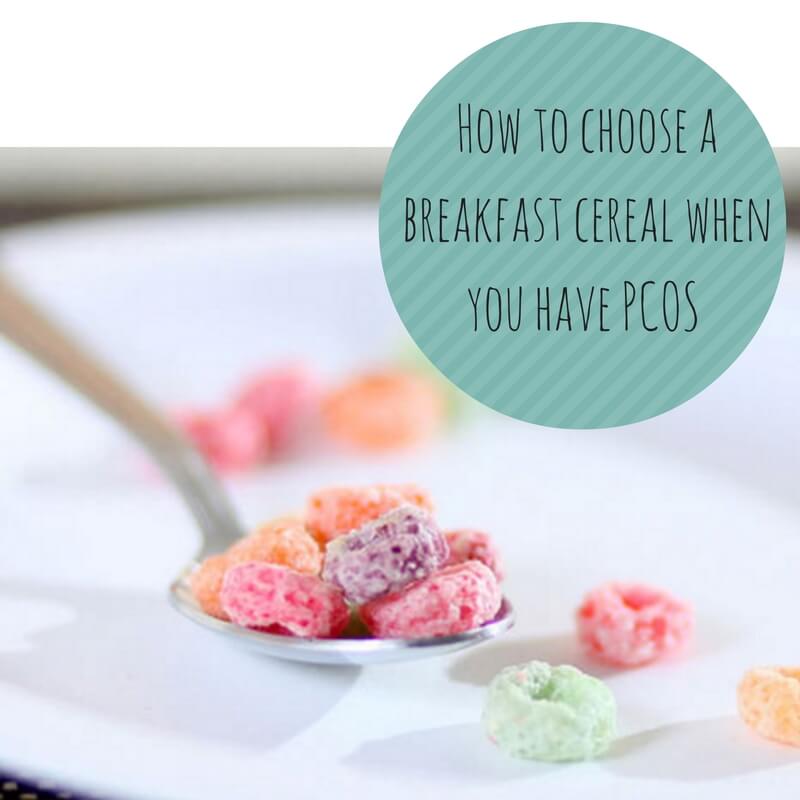
by AmyPlano | Aug 21, 2016 | PCOS Breakfast Foods
PCOS friendly cereals – Do they even exist?
So as a Powerful Chick with Outrageous Spirit I know what you are thinking.

PCOS friendly cereals do in fat exist. However, while I am certainly not advocating cereals along the like of Lucky Charms and Golden Grahams every day (although those do happen to be some of my favorites!) I do think there can be a place in the diet of the PCOSers for cereal. It is just as important to know which cereals to choose. Time to put our label reading glasses on and get to work.
Don’t Be Fooled
Information on the front of the box can be misleading. A lot of PCOSers look for products that state “low in sugar,” in an effort to watch their carbohydrates. Unfortunately, a cereal claiming to be “low in sugar” might not be as equally as awesome in terms of fat, whole grains, or sodium. Therefore, it important to read both the nutrition information panel as well as the ingredients to make the most educated decisions when it comes to PCOS friendly cereals.
Wholly grains
I say it a lot, and I’ll continue to do so: Whole grains and foods that contain whole grains provide a heck of a lot health benefits (especially for women with PCOS!). Whole grains contain all three parts of the grain along with fiber and many other nutrients such as B vitamins, vitamin E and magnesium.
Check the ingredient list on the cereal box. The first item listed should be a whole grain. Examples include but are not limited to whole wheat, whole-grain corn, barley, oats, oatmeal, millet, quinoa and wheat berries.
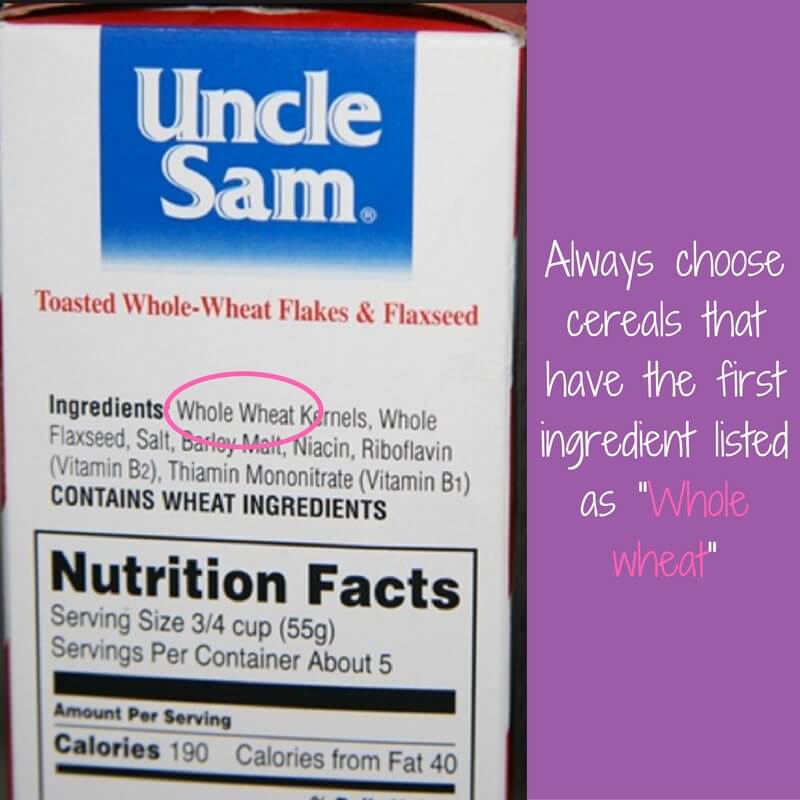
The words “multigrain,” “wheat,” “wheat germ,” and “bran” are not necessarily indicators of a whole grain. These terms may simply mean part of the grain is missing. Or in some cases the ingredient multigrain may imply many grains none of which are whole. Sneaky!
Fill up on Fiber
The health benefits of fiber and PCOS are endless. Research supports that diets that are high in fiber help lower blood sugar, assist with weight loss, lower cholesterol and help us poop. For women with PCOS, I would love for you get at least 30 grams of fiber per day. In an effort to meet these goals try to aim for cereal with at least 3 grams of fiber per serving.
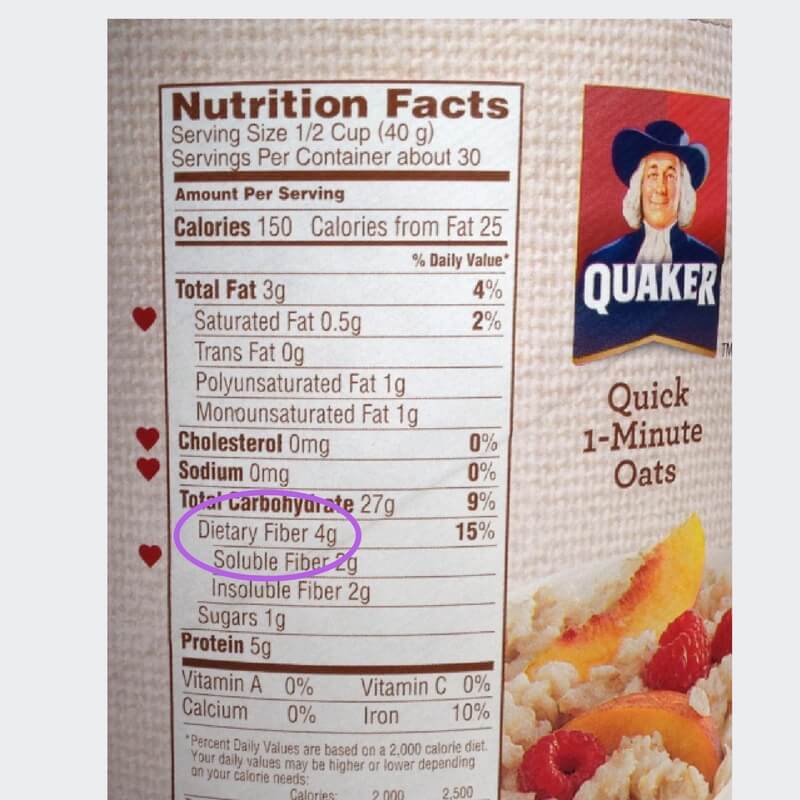
As you can see here, quick 1-minute oats have a whopping 4 grams of fiber. This is an excellent example of a high fiber cereal.
Limit the unhealthy fats
Saturated and trans fats are the bad guys. Fortunately for us, most PCOS friendly cereals are low in saturated fat and most have no trans fat. But if you’re a granola groupie, look out, as many granolas may contain saturated fat and contain more total fat than a bowl of French fries! And you thought all granolas were healthy…sadly not.
Look for cereals with zero grams of saturated fat and choose those with fewer than 4 grams total fat per serving.
Steer clear of high-sugar cereals they are of no benefit for women with PCOS
As a PCOSer sugar is the first thing that often comes to mind when you hear the word cereal. Given the high sugar content of many cereals you are often better off eating a bowl of crumbled up cookies and milk for breakfast. A good rule of thumb is to stick with cereals that have no more than 8–10 grams of sugar per serving. That’s roughly two teaspoons of sugar. Less is even better!

Note – In effort to optimize blood glucose control, remember to also look at the total carbohydrate grams (after checking out the serving size, of course), not just the grams of sugar. Try to aim for less than 35 grams of total carbohydrates per serving. But as a matter of principle, it pays to check out the grams of sugar on cereal labels.
Women with PCOS should seek out cereals that contain a modest amount of protein
Protein, as well as fat, plays a key role in extinguishing hunger. Ingesting protein provides staying power, so it may help you control the munchies. Look for PCOS friendly cereals with 3 or more grams of protein per serving. You’ll also get protein from the milk you add to your cereal. By adding 1 cup of 1 % milk to your cereal you are adding 8 grams of protein to your meal. For even more protein stir your cereal into some plain greek yogurt for an extra 12-18 grams of protein. Boom!
Shy away from sodium
Cereal is probably not the first food to come to mind when you think about high sodium foods. But surprisingly, some cereals contain some hidden sources. For example, one half-cup of Post Grape-Nuts contains 290 milligrams of sodium. General Mills Wheat Chex contains 270 milligrams per 3/4 cup serving. Stick with PCOS friendly cereals that contain less than 200 milligrams per serving.
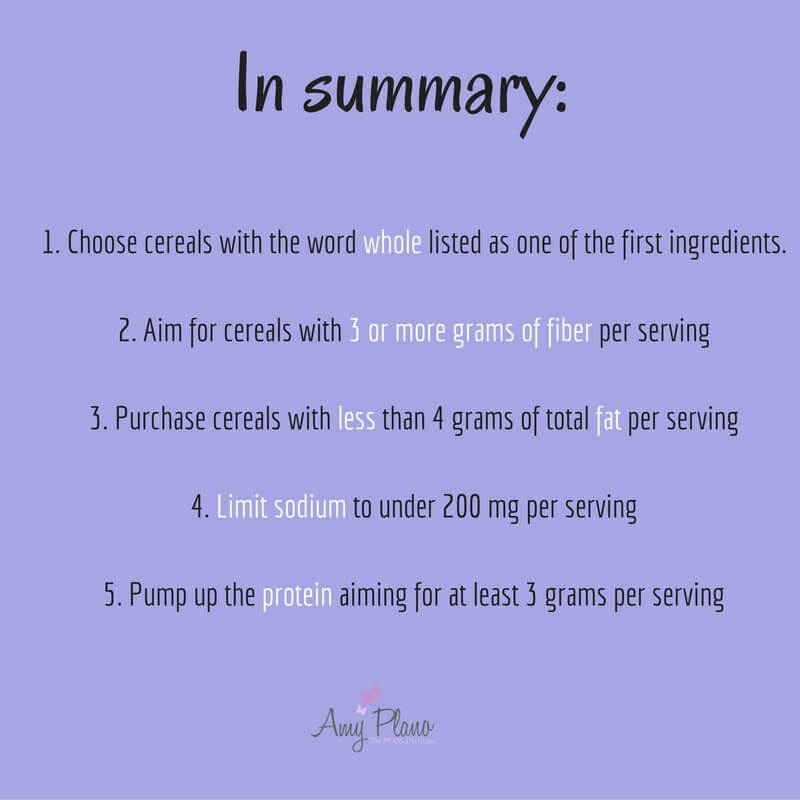
There is no denying it that you PCOSers love your cereal ♥ But by following the above guidelines you can steer away from cereals that damper your metabolism and choose those with some nutritional merit. As a rule of thumb I would recommend that women with PCOS consume cereal no more 1-2 times per week. While it certainly does have some nutritional value, there are other more quality breakfast foods I would love you to choose.




